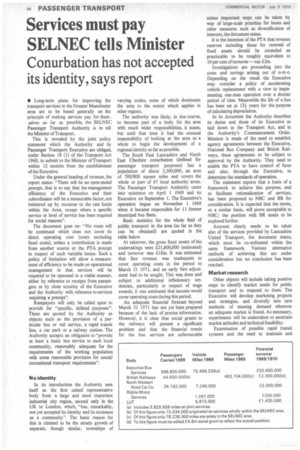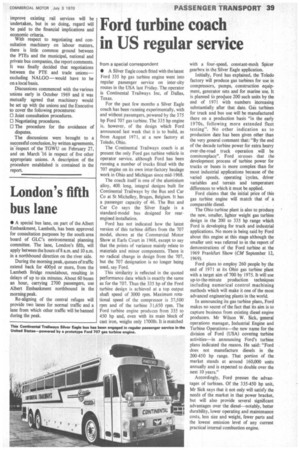Services must pay SELNEC tells Minister
Page 40

Page 41

If you've noticed an error in this article please click here to report it so we can fix it.
Conurbation has not accepted its identity, says report
• Long-term plans for improving the transport services in the Greater Manchester area are to be based generally on the principle of making services pay for themselves so far as possible, the SELNEC Passenger Transport Authority is to tell the Minister of Transport.
This is revealed by the joint policy statement which the Authority and its Passenger Transport Executive are obliged, under Section 18 (1) of the Transport Act 1968, to submit to the Minister of Transport within 12 months from the establishment of the Executive.
Under the general heading of revenue, the report states: "There will be no open-ended precept, that is to say that the management efficiency of the Executive and their subordinates will be a measurable factor, not bolstered up by recourse to the rate funds within the Area, except where a specific service or level of service has been required for social reasons".
The document goes on: "No route will be continued which does not cover its direct operating cost (costs excluding fixed costs), unless a contribution is made from another source or the PTA precept in respect of such variable losses. Such a policy of limitation will allow a measurement of efficiency to be made on operational management in that services will be required to be operated in a viable manner, either by reference to receipts from passengers or by close scrutiny of the Executive and the Authority with reference to services requiring a precept".
Ratepayers will only be called upon to provide for "specific, defined purposes". These are quoted by the Authority as objects such as the provision of a particular bus or rail service, a rapid transit line, a car park or a railway station. The 'Authority accepts an obligation to "provide at least a basic bus service to each local community, reasonably adequate for the requirements of the working population with some reasonable provision for social/ recreational transport requirements".
No identity In its introduction the Authority sees itself as the first united representative body from a large and most important industrial city region, second only in the UK to London, which, "has, remarkably, not yet accepted its identity and its existence as a community". The basic reason for this is claimed to be the steady growth of separate, though similar, townships of varying scales, none of which dominates the area to the extent which applies in other regions.
The authority was likely, in due course, to become part of a body for the area with much wider responsibilities, it states, but until that time it had the unusual responsibility of looking at the area as a whole to begin the development of a regional identity so far as possible.
The South East Lancashire and North East Cheshire conurbation (defined for passenger transport purposes) has a population of about 2,500,000, an area of 700/800 square miles and covers the whole or part of 67 local authority areas. The Passenger Transport Authority came into existence on April 1 1969 and its Executive on September 1. The Executive's operation began on November 1 1969 when it became responsible for 11 former municipal bus fleets.
Basic statistics for the whole field of public transport in the area (so far as they can be obtained) are quoted in the table below.
At takeover, the gross fixed assets of the undertakings were £21,800,000 (estimated) and turnover was £18m. It was estimated that fare revenue was inadequate to cover operating costs in the period to March 31 1971, and an early fare adjustment had to be sought. This was done and subject to additional inflationary tendencies, particularly in respect of wage awards, it was estimated that income would cover operating costs during this period.
An adequate financial forecast beyond March 31 1971 has not yet been prepared because of the lack of precise information. However, it is clear that social grants to the railways will present a significant problem and that the financial trends for the bus services are unfavourable unless important steps can be taken by way of large-scale priorities for buses and other measures such as diversification of interests, the document states.
It is the intention of the PTA that revenue reserves including those for renewal of fixed assets should be extended as practicable to be roughly equivalent to 10 per cent of turnover— say £2m.
Investigations are proceeding into the costs and savings arising out of o-m-o. Depending on the result the Executive may consider a policy of accelerating vehicle replacement with a view to implementing one-man operation over a shorter period of time. Meanwhile the life of a bus has been set at 12+ years for the purpose of calculating depreciation.
In its document the Authority describes its duties and those of its Executive as laid down in the Transport Act, and in the Authority's Commencement Order. Mention is made of the need to establish agency agreements between the Executive, National Bus Company and British Railways, these agreements to be subject to approval by the Authority. They need to enable the PTA to have control of fares and also, through the Executive, to determine the standards of operation.
The statement reports that a basis of a framework to achieve this purpose, and to facilitate rationalization of services, has been proposed to NBC and BR for consideration. It is expected that the terms, or a similar basis, will prove acceptable to NBC; the position with BR needs to be explored further.
Account clearly needs to be taken also of the services provided by Lancashire United Transport, the document states, which must be co-ordinated within the same framework. Various alternative methods of achieving this are under consideration but no conclusion has been reached.
Market research Other objects will include taking positive steps to identify market needs for public transport and to respond to them. The Executive will develop marketing projects and strategies, and diversify into new methods of meeting demand wherever an adequate market is found. As necessary, experiments will be undertaken to ascertain market attitudes and technical feasibility.
Examination of possible rapid transit systems and the need to maintain and improve existing rail services will be undertaken, but in so doing, regard will be paid to the financial implications and economic criteria.
With respect to negotiating and consultation machinery on labour matters, there is little common ground between the PTEs and the municipal, national and private bus companies, the report comments. It was finally decided that negotiations between the PTE and trade unions— excluding NALGO—would have to be on a local basis.
Discussions commenced with the various unions early in October 1969 and it was mutually agreed that machinery would be set up with the unions and the Executive to cover the following procedures: Joint consultation procedures.
Negotiating procedures.
O The procedure for the avoidance of disputes.
The discussions were brought to a successful conclusion, by written agreements, in-fespect of the TGWU on February 27, and on March 16 in respect of five other appropriate unions. A description of the procedure established is contained in the report.




































































































































































